Lead conversion to paying clients is the bread and butter for any business. But more often than not, while handling high volumes of prospecting, managing leads is often considered the most pressing challenge. In this respect, a lead management CRM is a quite useful business tool. This is because CRM systems help businesses stream their lead interactions by providing tracks and way to report on the progress obtained. Therefore, enhancing the conversion rates overtime.
In this blog, we are going to discuss lead management for CRM systems. We will also discuss how to use CRM for leads. Some practical CRM lead conversion tips have been mentioned below. By the end of this discussion, you will be able to understand why CRM is vital for businesses. CRM plays a significant role in improving sales performance for businesses.
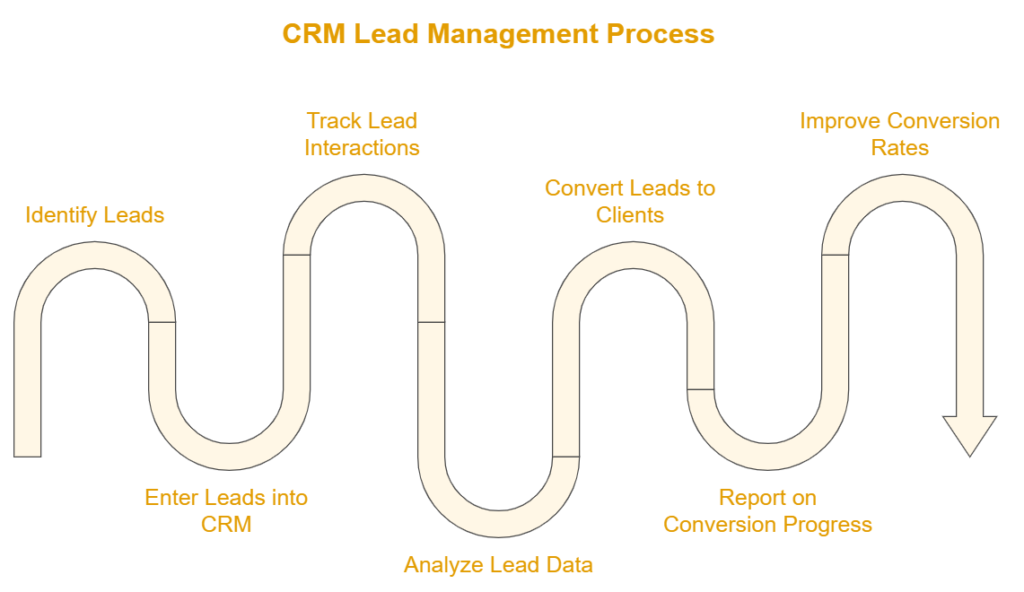
What is CRM?
A lead management CRM is a counterpart of the Customer Relationship Management system focusing on the process of coordinating, monitoring, and lead nurturing till they convert into a customer. It brings together all information regarding leads and puts the sales and marketing efforts in coordination with one another, so the entire process becomes relatively efficient and productive with higher chances of conversion.
Core Operations of CRM in Lead Management
- Lead Management: All lead information to be tracked and followed through on can be kept in a CRM. All contact details for the lead and previous interactions are kept in it. We will know how far a lead is on the sales funnel with that information.
- Track Interaction: CRMs monitor all interactions a business has with any form of communication it uses to reach its leads, including emails, calls, social media, or face-to-face meetings.
- Automation: Most CRMs are crafted with automation. They ensure that there are timely follow-ups for leads based on activity, and the messages will be personalized for the right leads at the right time.
- Reporting & Analytics: This helps an organization make sense of how leads are being managed and which strategy best converts within an organization.
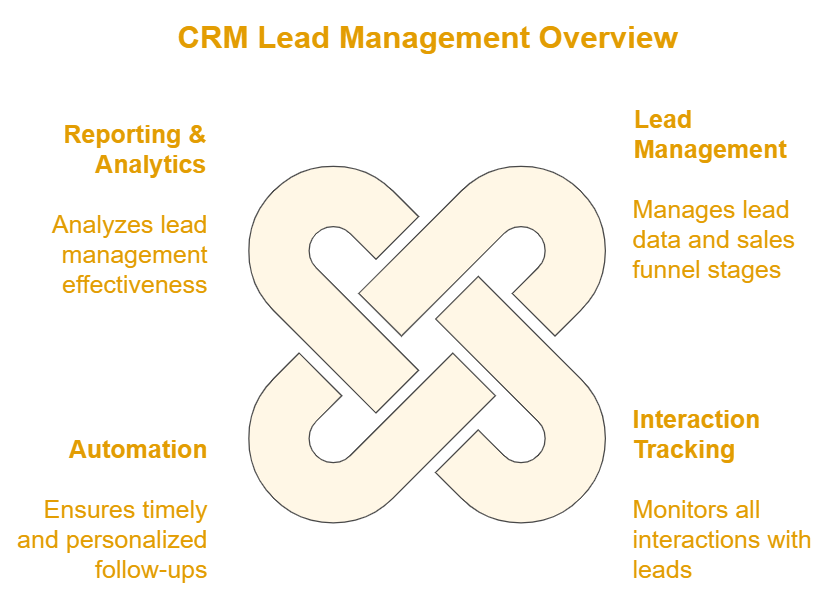
Lead Management through CRM
1. Centralization of Lead Data
The first significant advantage that one may derive from a lead management CRM is that the latter allows lead data centralization. Such centralization helps sales teams access current information regarding the status, preferences, as well as any form of interactions that have occurred with the company by a lead. With all this priceless information easily accessible for the sales reps, they can adjust their approach towards every lead in such a way that there will be a better conversion rate.
An organized CRM system will not ask the salespeople to dig into various spreadsheets or emails to acquire the details of a lead. Then the salesperson can view everything in one place, thus making easier a process that would have otherwise had a high chance of going astray.
2. Making it Easy to Communicate
Communication is a must to drive leads into becoming customers. CRMs ensure that clear and consistent communication takes place with leads, through features like the following:
- Email Management: CRMs also interact with email services so that all the emails that are sent and received by leads are automatically documented, and important communication is not missed.
- Follow Up: The sales team can use this to send follow-up reminders on the leads so that nobody slips out of their hands.
- Personalization: Such detailed information about a lead lets the sales team personalize communication with that lead. That lead becomes valued and understood.
Because they facilitate effective communication, a lead would never get converted against his or her desire, and because of this, a lead remains engaged in the whole buying process. In other words, this lead has greater chances of getting converted.
3. Lead Scoring and Prioritization
Each lead does not have an equal chance of conversion. Without a method to rank leads, your sales time is probably going waste on unqualified prospects. In order to rank leads, CRMs are equipped with the feature of lead scoring for lead management.
Lead scoring would award a score to every lead against pre-specified criteria, like the level of engagement by the lead, demographics, or behavioral characteristics. For example, one lead who downloaded several resources from your website and opened many emails originating from you would be scored higher than one who visited your homepage only once.
In putting time into the best-scoring leads, sales organizations can focus where those are most likely to convert into sales.
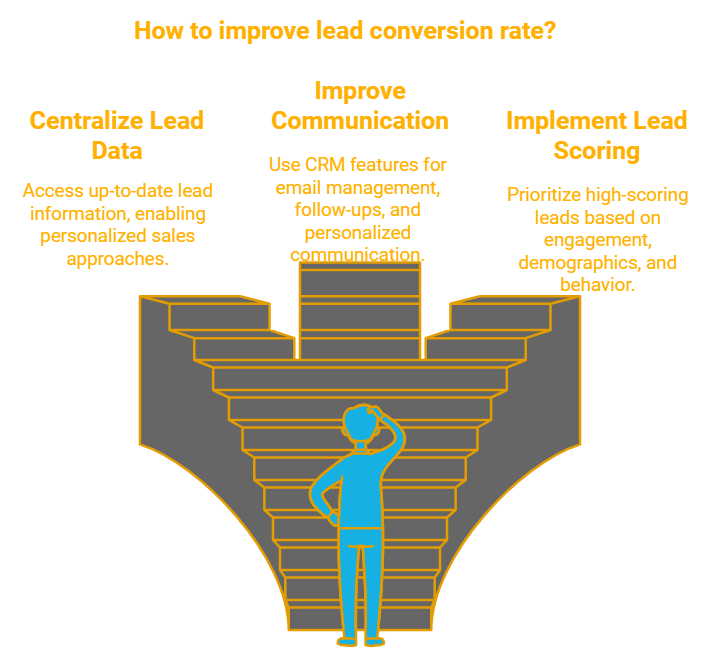
How to Use CRM for Lead Generation
A CRM manages leads but plays a very important role also in generating leads. Here’s how businesses can utilize a CRM for lead generation:
1. Integration with Marketing Campaigns
Most CRM solutions today can be integrated with marketing automation software that can track leads from all sources and then capture them from your website, social media campaigns, email campaigns, and even much more. All leads generated should be automatically channeled into your system for proper nurturing through this effective integration of your CRM with your marketing strategy.
2. Tracking Website Visitors
Others have an option of web tracking on the website. This means that one will be able to know the number of people visiting his company’s website, and those pages checked. These would later be analyzed to identify people showing interest in various products or services so that they could be targeted at the right time with the needed information.
3. Lead Capturing from Forms
Many of the CRMs have the facility of offering customized lead-capture forms, which will allow the business to place their landing page on the actual website. Once any visitor submits a form, the information of that person is updated automatically in the CRM. The lead generated is attributed to the specific salesperson who would further engage that lead.
4. Segmentation for Targeted Outreach
This will therefore be in a position to break down leads based on a wide range of criteria; be it location, industry, or even behavior. Segmentation would thus help close the lead gap. Also assist more tightly in outreach and marketing efforts, thus ensuring better lead generation. Ensuring that these leads are quite likely to convert.
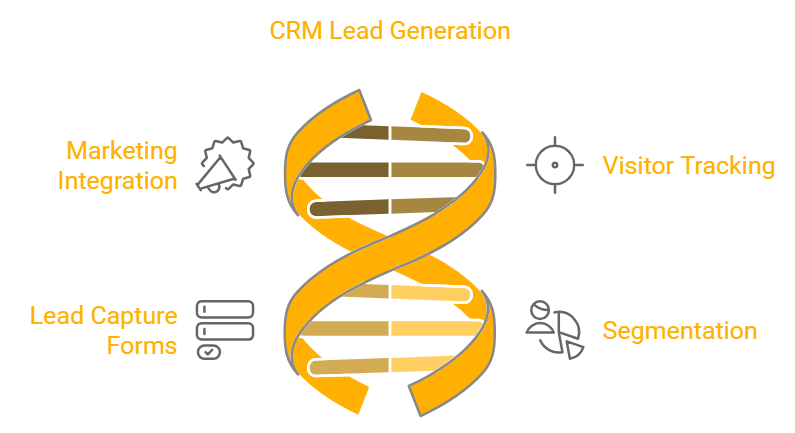
CRM Lead Conversion Tips
Now that we have talked in the above section about how the CRMs can help in the management of leads and generation, it is time to come forth with some CRM lead conversion tips that can show you just how to turn those leads into paying customers.
1. Nurture Leads with Automated Campaigns
It’s only very seldom that a lead is ready to buy on the first contact, the second contact, or the third contact. A CRM can then send automated email sequences and other communications, which will allow you to cultivate leads over time by providing them with valuable content and keeping you top of mind. How do you build trust with your leads and move them toward the purchasing decision?
2. Track Lead Engagement
Use your CRM to track how leads are engaging with your content and communication. Are they opening the emails? Are they opening links? That information will help you identify which leads have been most engaged with your content and, therefore, should be followed up for that conversation. On-time outreach that is informed through engagement metrics makes all the difference in a successful lead conversion.
3. Utilize Personal Communication
Personalization is one of the keys to having a good lead conversion. You can keep all your data in one place in your CRM. This allows you to tailor your communications to each lead’s specific needs and interests. A personalized message can help build rapport. This can lead to trust and conversion. Whether you’re mentioning names or discussing specific company interactions, a personalized message is effective.
4. Analyze and Refine Your Lead Conversion Process
A CRM will give you very valuable insight in your lead conversion process where you can look at what’s working and what is not. Analysis of conversion rates will provide insight. Length of sales cycles and lead sources will also be evaluated. Insights from this analysis can help improve and refine the process. Often times, reviewing data on your CRM can help you be agile. Adapting to changes in the market or sales approach is possible with CRM data review.
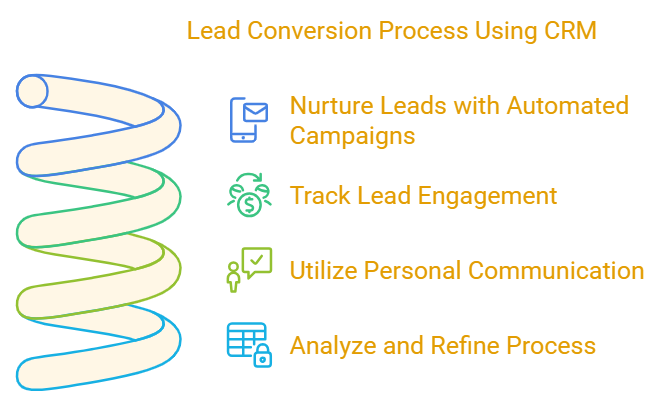
Conclusion
In a competitive business environment, converting leads into actual sales is essential for increasing business performance. A lead management CRM is a leading tool that helps in organizing and tracking every lead so that no opportunity will be missed. It reduces workflow redundancy and trims communication time while giving insights on lead behavior because lead data is centralized. It makes businesses more efficient and with higher conversion rates.
If you are just embarking on implementing a CRM system, or optimizing your existing one. Then, it is highly important to know the role of CRM in lead management. Implementing CRM lead conversion tips will further enhance your sales performance.
Get more boost in sales performance. Use the power of CRM for lead management. Turn more leads into loyal customers in your business. You can also check other blogs like Why do referral programs matter for quality lead generation?